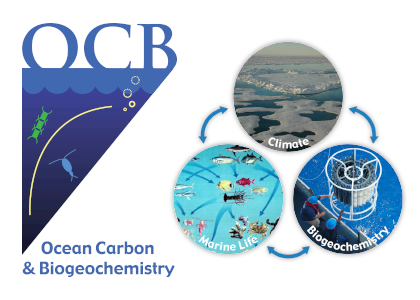Proposal info webinar September 23, 3-4pm
This webinar featured recent successful OCB activities and their PIs, Q&A with Project Office staff on community building and what makes a successful OCB proposal and activity.
The Ocean Carbon and Biogeochemistry (OCB) Program is soliciting proposals for OCB activities that will take place or begin during the 2026 calendar year. We seek proposals for OCB-relevant workshops and activities as follows:
- Workshops and training activities – These activities bring together practitioners across disciplines to build community and/or capacity on OCB-relevant topics (see scientific scope below). A training activity is typically limited to 30-40 participants, and a topical workshop is typically limited to 50-60 participants. A hybrid format is strongly encouraged to broaden input and impact. We also welcome proposals for fully virtual workshops and training activities. The participant selection process for training activities should use a pre-determined evaluative rubric. Budgets for these activities will be capped at $70,000.
- Small group activities – These activities have a specific focus and set of outcomes. They are typically limited to ~8-16 participants and 1-2 years in duration. The majority of participant interaction must take place virtually. Work is to be completed both synchronously and asynchronously via Zoom and collaborative tools (e.g., Google Suite). A small amount of funding (add-on hotel night, food and beverage) can be provided to accommodate a side meeting in conjunction with other workshops (OCB, AGU, OSM, etc.), and publication costs. If a small group activity is a follow-on or direct outgrowth of a previous OCB activity, this connection should be explicitly noted, and PIs must address how this activity will further advance progress. Budgets for these activities will be capped at $15,000.
- Regional hubs – This is a relatively new OCB activity model (based on the OCB-supported regional mCDR nodes) that aims to foster community building at the regional scale on OCB-relevant topics, including practitioners across sectors, disciplines, and career stages. A small amount of funding is provided to support one large or a series of smaller gatherings, as well as funding to support outcomes (e.g., publications, outreach materials, etc.). There is no travel/lodging support available for these activities, as all participants should be local or within driving distance of a regional hub. Budgets for these activities will be capped at $10,000.




